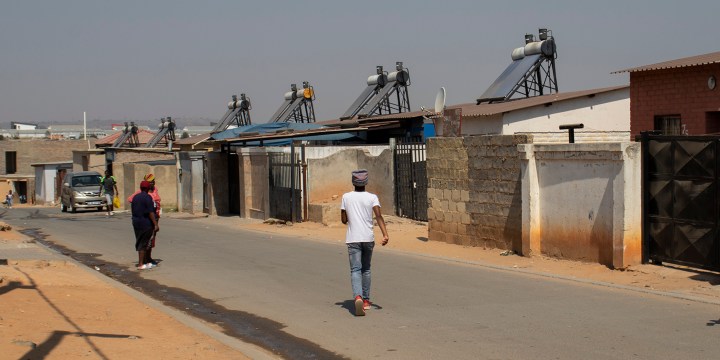RiGHT OF REPLY
Misguided OUTA is barking up the wrong tree

In this right of reply, the SA Local Government Association takes issue with a column by Wayne Duvenage of the Organisation Undoing Tax Abuse.

Salga’s Lance Joel.
The desire for public office goads people to find creative ways to remain relevant. Having one’s name circulating in the public domain and receiving constant media coverage is one such strategy to maintain relevance.
While shrewd politicians craft a message of hope to win the hearts and minds of people, excited amateurs can find themselves barking up the wrong tree.
The latter is exactly what is happening with Mr Wayne Duvenage, the CEO of Organisation Undoing Tax Abuse (OUTA), who has mischievously positioned Salga as a foe of local government and is targeting it in a political campaign.
His recent article Has Salga’s day of reckoning arrived? and the previous one titled Municipal Managers Mindlessness appear to be the actions of someone who is in a quest to remain relevant for purposes of campaigning for public office in the forthcoming 2021 and 2024 elections.
The right to freedom of association and to be elected for public office is enshrined in the Constitution and it is a right Mr Duvenage is free to exercise.
However, reasonable people would agree that it would be best if he declared any such intentions publicly so that they can make informed decisions about supporting or funding his organisation. We believe that failure to do so would risk making OUTA and its funders complicit in a political agenda.
South Africans should not be surprised if Mr Duvenage and his ilk officially announce their political campaign later in the year.
His recent attempt at tarnishing the reputation of Salga and sowing the seeds of doubt in the public mind about the relevance of our organisation cannot be left unchallenged.
His attacks on Salga exposes his ignorance and little understanding of the history, purpose and role that Salga plays in local government.
Salga and our Constitutional Framework
Ordinary South Africans will be forgiven for assuming that a person occupying a senior position of Chief Executive of an organisation ought to have basic knowledge of our country’s constitutional and governance framework.
Salga is an organisation established in terms of the section 163 of the Constitution, which enjoined the democratic government to form and recognise national and provincial organisations that represent municipalities.
It is embarrassing that someone who clearly harbours ambition for political office could be so ignorant of such constitutional provisions. Ignorance is, indeed, blissful.
Since its establishment in 1997, Salga has represented all municipalities across the length and breadth of South Africa irrespective of which political party is in power. We have structures in all nine provinces, whose composition mirrors the political representation, representation in the Finance and Fiscal Commission that recommends the allocation of the budget of the country as well as the National Council of Provinces.
Our membership is testament to the confidence that municipalities have on Salga. The very fact that municipalities led by different political parties have continued to affiliate annually over the past 24 years is proof that they derive value and appreciate the contribution that Salga makes in local government.
A few highlights of Salga’s achievements
Salga has had countless achievements over the years, inter alia, our successful lobbying for a new energy deal which enables municipalities to build their own energy generation capacity and to procure energy from independent power producers.
There is not a single piece of legislation that impacts the local government sphere that has passed without Salga’s influence and scrutiny. The new requirement for all parliamentary bills to have their impact on local government assessed first before they can be passed is a victory that Salga fought for in the interest of municipalities. The regulatory impact assessment tool used in this regard is a product of our work.
Salga’s Centre for Leadership and Governance is an incubation hub that continues to produce leaders of national and international standing. Most of the leaders in national and provincial government, National Assembly, the NCOP and provincial legislatures across the country have passed through our leadership programme.
Salga is an equal among its international peers. Our previous presidents have served at the helm of the leadership (presidency) of continental and global bodies that represents local government in the United Nations system (the United Cities and Local Governments), the African Union (United Cities and Local Governments of Africa (UCLGA), the Commonwealth Local Government Forum and the Metropolis. The current president of Salga is also serving as co-president in the leadership of these international organisations. All this attests to the role that Salga plays in grooming and developing leadership capabilities to serve in various responsibilities.
A direct benefit of our participation in these multi-national bodies has been the mobilisation and securing of significant funding support which has made it possible for some of our cities to benefit in the international twinning programmes on the climate crisis, local economic development etc. These are just but a few examples among many of our achievements over the years.
Salga’s record of 12 years of consecutive unqualified audits, of which the last seven have been clean audits, speaks for itself. The South African Institute for Chartered Accountants has, for the past three years in succession, recognised Salga for its sterling financial management.
Criticising municipalities is not our raison d’être
Salga is a constitutional body neatly stitched into the intergovernmental system to strengthen, not destroy municipalities as OUTA would like us to do. Criticising municipalities is not our raison d’être. Even when we criticise, ours is constructive criticism in line with our mandate to support and strengthen municipalities.
It is for these reasons that we have been intensifying the implementation of consequence and accountability measures since 2014. The latest call we have made for national government to withhold grants for those municipalities that have transgressed is consistent with the work we have been doing over the past years.
The request by National Treasury for a relook on wage bargaining agreements is a universal call made to all unions and bargaining bodies in all spheres of government. It was not made to Salga alone. To suggest that Salga’s call for withholding of funds was in reaction to this smacks of ignorance or mischief.
Efforts to combat corruption in municipalities are beginning to bear fruits. As of February this year the National Prosecution Authority had 86 cases of fraud and corruption already in court, involving over R1.3 billion. Meanwhile, the SIU is also investigating 66 cases of fraud, corruption and maladministration that have been referred to it by municipalities. There are currently 34 senior managers suspended for misconduct.
All of these instances show the commitment within local government to enforce consequence management and hold people to account. Municipalities have not been waiting for messianic OUTA to rescue them from corruption; they have been taking action to curb this scourge.
Consumer debt throttles municipalities
Mr Duvenage signals alarm about municipalities that are broke, yet he doesn’t tell us as to why they are broke. The reality is that our national economy is struggling and municipalities are feeling the brunt of the low growth and high unemployment rate that has ravaged our communities. With the Covid-19 outbreak, we can only expect the situation to worsen.
The funding model for municipalities has not kept pace with service delivery demands, a view made more sharply by the Auditor General. The rate of the growth on municipal funding as appropriated through the equitable share, is outpaced by infrastructure backlogs and inward migration into the country and into our cities.
Whereas a shrinking revenue base compounds these problems, a high consumer debt further throttles municipalities’ ability to fulfil their mandates.
In the latest report of March 2020, National Treasury highlights that the aggregate municipal consumer debt stood at R181.3-billion. About 70.5% of this (R127.7-billion) was money owed by households and 10% by government departments and the rest by businesses.
The auditor general in his latest report also concurs that this is a challenge that is crippling municipalities with “almost 60% of the revenue shown in the books [which] will never find its way into the bank accounts of the municipality”. This is, as the AG laments, because of a growing trend of “established businesses… showing signs of diminishing ability to pay…” and “individuals and households… not forthcoming with payments…”
This is the precarious financial environment in which all municipalities, irrespective of which political party is at the helm, find themselves.
These issues are complex and clearly above the comprehension of Duvenage and OUTA, who have made publicity stunts and peddling of falsehoods their purpose.
Campaigning for public office requires more than howling gigantic curses at organisations such as Salga. A message of hope and a clear plan of action informed by correct analysis and understanding of the challenges facing local government is a sine qua non to nurse an ambition for public office leadership.
However, if OUTA and Mr Duvenage are truly committed to “Working with communities and authorities in improving administration and service delivery, within all spheres of Government” as they suggest in their mission statement, Salga is keen to engage with OUTA constructively with the aim to strengthen municipalities rather than to participate in these mindless public spats.
Salga is not a foe of local government. We are an organisation established for the purpose of strengthening and not destroying local government. Stop barking up the wrong tree. DM
Lance Joel is the Chief of Operations of the South African Local Government Association (Salga).

















 Become an Insider
Become an Insider